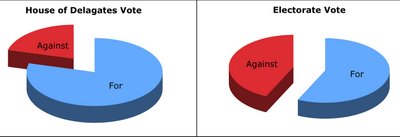A Political Disconnect In Virginia
VOTING ON THE VIRGINIA MARRIAGE AMENDMENT

The above pie charts tell a story of the political disconnect between the people of Virginia, the electorate, and their elected delegates to the Virginia legislature.
The people spoke yesterday and they are far less in favor of amending the Commonwealth’s Bill of Rights to define marriage than is the legislature. The Virginia Senate, by the way, voted 100% for the amendment.
Although reported in the press at the time and well known to the opponents of this legislation, the politics of this measure deserve revisiting. This measure was spirited through the legislature at the beginning of this year’s session with remarkably little debate for so momentous an alteration to the state's highest law. And this was largely due to the obsessive crusade of Delegate Robert Marshall, to minimize the opportunity of the opposition to present fact and rational argument.
But it more importantly shows how a legislature, who often see their seats, due to the power of incumbency, as personal fiefdoms and the legislature as an old boys club, are, as are many legislatures, trailing public sentiment and values.
Polls show that perhaps 70% of Virginians 18 to 26 actually favor allowing gay marriage.
The statewide conversation that has ensued due to this amendment has certainly begun an education process. Some members of the legislature have even reversed their positions from their original votes and now say they object to the amendment. Of these is Delegate Katherine Waddell, who ironically won over Brad Marrs by a margin of only about 40 votes after Marrs used references to a gay businessman contributing to Waddell’s campaign in his own campaign mail outs.
The tide of public opinion is turning. Although 20 states had passed marriage amendments, and seven more did yesterday, Arizona yesterday became the first state to defeat an amendment to ban gay marriage.
The tide of history is suggesting that gay civil rights as a social movement is inevitable. It is unfortunate that now we in Virginia have this discrimination engraved in our constitution, and thus Delegate Marshall has a legacy that will be around for some years to come.

The above pie charts tell a story of the political disconnect between the people of Virginia, the electorate, and their elected delegates to the Virginia legislature.
The people spoke yesterday and they are far less in favor of amending the Commonwealth’s Bill of Rights to define marriage than is the legislature. The Virginia Senate, by the way, voted 100% for the amendment.
Although reported in the press at the time and well known to the opponents of this legislation, the politics of this measure deserve revisiting. This measure was spirited through the legislature at the beginning of this year’s session with remarkably little debate for so momentous an alteration to the state's highest law. And this was largely due to the obsessive crusade of Delegate Robert Marshall, to minimize the opportunity of the opposition to present fact and rational argument.
But it more importantly shows how a legislature, who often see their seats, due to the power of incumbency, as personal fiefdoms and the legislature as an old boys club, are, as are many legislatures, trailing public sentiment and values.
Polls show that perhaps 70% of Virginians 18 to 26 actually favor allowing gay marriage.
The statewide conversation that has ensued due to this amendment has certainly begun an education process. Some members of the legislature have even reversed their positions from their original votes and now say they object to the amendment. Of these is Delegate Katherine Waddell, who ironically won over Brad Marrs by a margin of only about 40 votes after Marrs used references to a gay businessman contributing to Waddell’s campaign in his own campaign mail outs.
The tide of public opinion is turning. Although 20 states had passed marriage amendments, and seven more did yesterday, Arizona yesterday became the first state to defeat an amendment to ban gay marriage.
The tide of history is suggesting that gay civil rights as a social movement is inevitable. It is unfortunate that now we in Virginia have this discrimination engraved in our constitution, and thus Delegate Marshall has a legacy that will be around for some years to come.
Comments